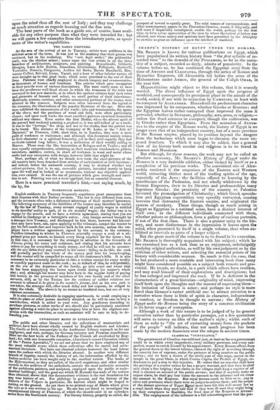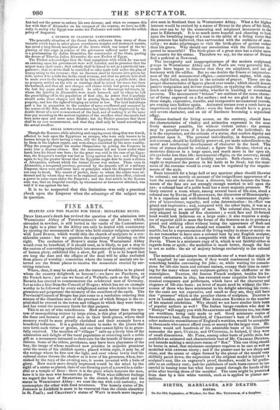SHARPE'S HISTORY or EGYPT UNDER THE ROMANS. Ma. Sunitrs is
known for varicius publications on Egypt, which have popularized its written history from " the fm-st syllable of recorded time " to the downfal of the PTOLEMIES, SO far as the narrative of a subject, recorded so dryly, admits of popularity. In the volume before us, he has continued the Egyptian story from the time of ANTONY and CLEOPATRA, through the series of Roman and Byzantine Emperors, till Alexandria fell before the arms of the Mahoinetans under Asisiou, the general of the Caliph OMAR, in the year 640.
Hypercriticism might object to this volume, that it is scarcely wanted. The direct influence of Egypt upon the progress of mankind, and consequently its prominent place in the annals of the world, ended, if not with its reduction by CAraiirsEs,at least with its conquest by ALEXANDER. Henceforth its predominantcharacter was impressed by its conquerors, whether Greeks or Romans; and the Egyptian leaven rather corrupted than improved the mass it pervaded, whether in literature, philosophy, arts, arms, or religion,— unless the fixed sciences be excepted, though the cultivation, WM by Greeks rather than Egyptians. From the accession of AUGUR. TUS to the empire of the Roman world, the history of Egypt is no longer even that of an independent country, but of a mere province of the Roman empire, placed by its position beyond the dangers from the barbarians which soon began to threaten the more exposed frontiers. To which it may also be added, that a general view of its history both secular and religious is to be found in GIBBON and MOSHEIM.
But although, for these reasons, the work may not be called an absolute necessary, Mr. SHARPE'S History of Egypt under the Romans is a very desirable addition, either viened by itself or as completion of his previous works. The convenient site of Alexandria rendered it the emporium of the Eastern and Western world, attracting thither most of the trading spirits of the age, especially of the Jews : the facilities offered to learning by the munificence of the Ptolemies, and not wholly withdrawn by the Roman Emperors, drew to its libraries and professorships many ingenious Greeks : the proximity of the country to Palestine favoured the promulgation of Christianity; which Greek specular tion and Egyptian superstition very speedily corrupted, causing heresies that distracted the Eastern empire, and originated the system of monkery. These things, though as much arising in Egypt as Egyptian in a national sense, have a distinct interest of their own ; as the different individuals connected with them, whether priests or philosophers, form a gallery of curious portraits., if not of the first class. There is also a greater unity in the history, and more distinctness in the impression it leaves upon this mind, when presented by itself in a single volume, than when exhibited at intervals as parts of a larger subject. But the great merit of the volume is to be found in its execution, Mr. SHARPE is thoroughly acquainted with his subject ; which he has examined less as a task than as an enjoyment, indefatigably studying original authorities, as well by his own judgment as by the criticism of other writers, and selecting the essential points of his history with considerable acumen. So much is this the case, that he has produced a more readable and interesting book than many might have considered possible on a subject both remote and provincial. He treads, no doubt, in a path which others have trodden, and may avail himself of' their explorations and descriptions; but he has enlarged and improved the road. If he is deficient in the characteristic of a great historian—originality of mind, impressing itself both upon the thoughts and the manner of expressing them— his imitation of GIBBON is sober; and perhaps no style is more fitted than GIBBON'S rather artificial one to attract attention to a narrative where there is little of spirit in character, independence in conduct, or freedom in thought to narrate ; the History of Egypt under the Romans being the story of a concrete civilization in its latter stages of corruption.
Although a work of this nature is to be judged of by its general execution rather than by particular passages, yet a few quotationa will serve to convey an idea of the author's style ; whilst such of them as refer to "the art of extracting money from the pockets of the people" will indicate, that not much progress has been made by the modern financiers over the adepts in ancient times.
CLASSICAL "PURVEYANCE."
The government of Claudius was mild and just, at least as far as a government could be in which every taxgatherer, every military governor, and every subprefect, meant to enrich himself by his appointment. Every Roman officer, front the general down to the lowest tribune, claimed the right of travelling through the country free of expense, under the pretence of being couriers on the public service ; and we have a decree of the ninth year of this reign, carved on the temple in the great Oasis, in which Cricks Capito, the Prefect of E„eypt, endeavours to put a stop to this injustice. Be orders that no traveller shall have the privilege of a courier unless he has a proper warrant, and that then he shall only claim a free lodging; that clerks in the villages shall keep a register of all that is claimed on account of the public service ; and that if anybody make an unjust claim, he shall pay four times the amount to the informer and six times the amount to the Emperor. Bat royal decrees could do little or nt. Aug is cities and provinces where there were no judges to enforce them ; and the people of the distant province of Upper 'Sept must have felt this well-mea.ut lax as a cruel insult when they were told that if they were ill-used they might bring Up their complaints to Baailides, the freed man of the Emperor at Menu. dila. The employment of the informer is a full acknowledgment that the pre.
feet bad not the power to enforce his own decrees; and when we compare this Jaw with that of Alexander on his conquest of the country, we have no difficulty in seeing why Egypt rose under the Ptolemies and sunk under the selfish policy of Augustus.
A GLIMPSE OF CLASSICAL TAXGATHERING.
The peaceable situation of the Great Oasis, withrawn from many of those tumults which have in other places overthrown temples and destroyed records, has saved a long Greek inscription of the decree which was issued at the beginning of this reign in redress of the grievances suffered under Nero. It is a proclamation by Julius Demetrius, the commander of the Oasis, quoting the decree of Tiberius Julius Alexander, the new Prefect of Egypt.
The Prefect acknowledges that the loud complaints with which he was met on entering upon his government were well founded, and he promises that the unjust taxes shall cease ; that nobody shall be forced to act as a provincial taxgatherer; that no debts shall be cancelled or sales made void under the plea of money owing to the revenue; that no freemen shall be thrown into prison for debt, unless it be a debt due to the royal revenue, and that no private debt shall be made over to the taxgatberer to be by him collected as a public debt; that no property settled on the wife at marriage shall be seized for taxes due from the husband, and that all new charges and claims which had grown up within the last five years shall be repealed. In order to discourage informers, by whom the families in Alexandria were much harassed, and to whom he laid the great falling-off in the population of that city, he orders that if anybody should make three charges and fail in proving them, he shall forfeit half his property, and lose the right of bringing an action at law. The land had always paid a tax in proportion to the number of acres overflowed and mauured by the waters of the Nile, and the husbandmen had latterly been frightened by the double threat of a new measurement of the land, and of making it at the same time pay according to the ancient registers of the overflow when the canals had been more open and more acres flooded ; but the Prefect promises that there shall be no new measurement, and that they shall only be taxed according to the actual overflow.
LEGAL LIMITATION OF IMPERIAL POWER.
Though the Romans, while admiring and copying every thing that was Greek, affected to look upon the Egyptians as savages, who were only known to be human beings by their having a voice, still the Egyptian physicians were held by them in the highest repute, and were always consulted by the more wealthy. "Pliny the younger repaid his oculist Harpocrates by getting the Emperor to make him a Roman citizen. But the statesman did not know under what harsh laws his friend was born ; for the grant was void in the case of an Egyptian, the Emperor's reseript was bad as being against the law ; and Pliny had again to beg the greater favour that the Egyptian might first be made a citizen of Alexandria, without which the former favour was useless. Thus, even in Alexandria, a conquered province, governed by the despotic will of a military Emperor, there were still some laws or principles which the Emperor found it not easy to break. The courts of justice, those to whom the edicts were addressed and by whom they were to be explained and carried into effect, claimed a power in some cases above the Emperor ; and the first article in the Roman code was, that an Imperial rescript, by whomsoever or howsoever obtained, was void if it was against the law.
It is to be suspected that this limitation was only a practical check upon the Emperor when the advantage of the subject was in question.



























 Previous page
Previous page